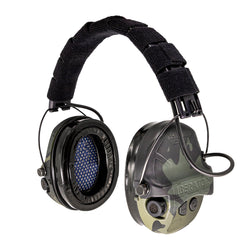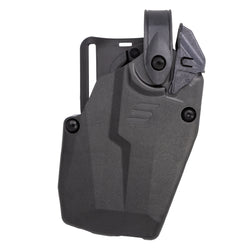The world of the handgun red dot has exploded, and every year it explodes more and more. Heck, this year, I saw two companies introduce red dot optics on revolvers. The technology has evolved rapidly, and we are seeing a very clear move to enclosed emitters and an introduction of new technologies we haven’t seen before.
After walking miles of aisles, I’ve put together what I think are the most interesting red dots coming out in 2025 and a good representation of where the industry is going.
The Best Handgun Red Dots At SHOT
It’s become very clear that enclosed emitters are here to stay. In fact, they are taking over. The majority of new handgun red dot releases are enclosed emitters. While there are more open emitters at SHOT, the major companies are moving toward enclosed emitters.
Aimpoint COA
The Aimpoint COA is a project taken on by Glock and Aimpoint to provide not only a new handgun red dot sight but also a new optic cut. Don’t say Boo yet; it’s not a new footprint just to be different, but rather a revolutionary way to lock an optic onto a gun.

The A-Cut uses a front shelf to lock the optic in, and a rear sight that secures the optic via a pair of bolts. The COA gets rid of bolts and plates, which reduce break points, and tolerance stacking. The A-Cut is odd, and proepirtary to Aimpoint and Glock, but promising.

The Aimpoint looks and feels like an Aimpoint. It’s clear, the dots crisp, and it’s easy to use. It sits low enough to make cowitnessing easy. The COA can even mount to the smaller Glocks, like the 43X and 48.
C&H Precision EDC Enclosed
C&H Precision went from producing plates to mount optics to producing red dots. The new EDC Enclosed is a micro-sized enclosed emitter handgun red dot. It’s designed to fit the Shield RMSc footprint, which has become the universal option for micro-sized handguns.

The EDC Enclosed does things right. Like the side loading optics tray for swapping batteries, Nice big buttons that are easy to press, and even a built-in notch for those guns that force you to ditch the rear sight when you mount an optic.

What the EDC Enclosed does best is provide an enclosed emitter handgun red dot that costs less than $250. With an MSRP of $248.99, the EDC Enclosed keeps things simple enough to keep them affordable.
Burris Fastfire E
The Burris Fastfire 3 was my very first handgun red dot. I beat the hell out of it for several years, and it still runs to this day. The Fastfire E caught my eye at SHOT.

The Burris FastFire E series takes an enclosed route. The FastFire E closes things up and moves the battery tray to the left side of the optic. It’s designed to work with the ACRO footprint, so it’s easy to mount.

What the Fastfire E does differently is make the handgun red dot huge. It’s massive, with a surprisingly clear lens with an aspherical lens and a nice 3.5 MOA red dot. Battery life tops out to 60,000 hours. Plus, it won’t break the bank with an MSRP of $420.
Gideon Valor Mini
The Gideon Valor Mini comes from the value brand Gideon Optics. The Valor Mini is another RMSc footprint-enclosed emitter handgun red dot. At first glance, the Valor Mini and C&H Enclosed EDC look almost identical, but the Valor Mini has an MSRP of $329, so what’s the difference?

The Valor Mini does have a few higher-end features. The optic comes with multiple reticles that give you a dot, a circle, and a dot and circle. Bigger reticles can be easier to see, and circular reticles are often an option for shooters with astigmatism.

Additionally, the Valor Mini comes with a Picatinny rail adapter. The Valor Mini has all the features I love, like shake-awake technology, bright and clear reticles, and an IPX7 rating for water resistance.
Primary Arms HTX-1
Primary Arms makes some outstanding optics, but outsources their construction. That’s changing with the HTX-1. This American-made handgun red dot features an enclosed design that solves a few of the problems with enclosed designs.

The HTX-1’s big claim to fame is its mounting system, which PA calls the Modular Chassis system. Simply put, you attach a plate to the gun that matches the slide’s footprint. You then attach your optic to that plate via screws from the side rather than the top.

The HTX-1 will co-witness with standard heigh iron sights and sit lower than any other enclosed emitter optic, except maybe the COA. PA offers a few reticle options and features like Shake Awake, a side-mounted battery, and clear glass and reticles.
Infitac Fast Mini
The Infitac Fast Mini pistol sight is my wildcard. It’s a thermal handgun optic. It’s not quite a red dot, but a 1X thermal system small enough to mount on a handgun. I’m not sure how useful a handgun thermal can be for defensive use, but it’s obviously a great hunting tool.

The Fast Mini pistol thermal is tiny and does use the little 256X resolution mixed with a 60 hz refresh rate. The size of the optic limits its usefulness in some cases. It’s effective for handgun ranges with a recognition range out to 100 yards.

I used the Fast Mini on the Show floor and was impressed by the picture’s clarity. The swipe-up touchscreen design to change the way the thermal provides data was brilliant and a lot of fun. What kills the optic is the five-hour run time, which is not much.

I think this is an interesting option for some niche uses and more of a proof of concept than anything else.
The Handgun Red Dot World
Handgun red dots are the norm now. If you release a gun without an optic mount, people will question why. Handgun red dots are now moving into the enclosed format, which only makes sense. It’s the more reliable option, and when it comes to defensive firearms use, we want reliability.
I‘m excited to keep watching this market evolve and grow, and if 2025 is any indication, it’s not slowing down.









